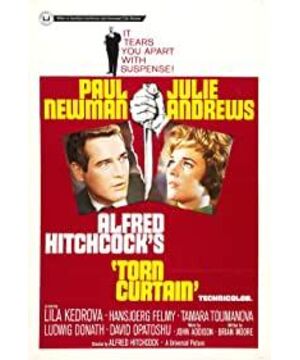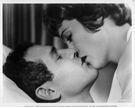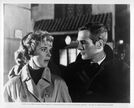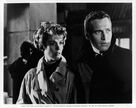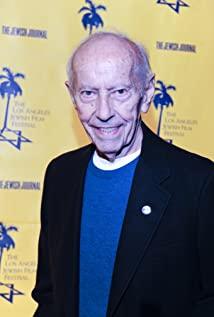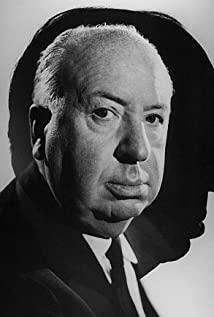A cup originally contained in "Watching Movies·Midnight Field" can hold different liquids. Thick soup, light tea, spirits, and water depend on the intention of the person who prepares the liquid. In a two-hour movie, what kind of sound, picture, plot, and characters are included in a movie, and it also shows the director's intentions. Watching Hitchcock's movies usually expect a strong breath, and Hitchcock rarely disappoints viewers. However, in the late 1960s, Hitchcock successively filmed two spy films, "Break through the Iron Curtain" and "Topaz". The quality of the films, as Hitchcock's master, is very mediocre. [Breaking the Iron Curtain] It was the beginning of Hitchcock's gradual loss of radiance. It seemed to be a special taste of Hitchcock's wine. Although there was still Hitchcock's breath, it was ordinary and not good to drink.
Procrastination and looseness: Compared with the Hitchcock movie, the plot of [Break through the Iron Curtain] has lost its compactness, showing a rare looseness. Moreover, this looseness is not a deliberate emotional tone, but meaningless procrastination and looseness caused by improper organization of plot components.
[Intimacy] At the beginning of the film, it seems very irritating. Professor Michael Armstrong, who is going to Germany to do secret operations, and his assistant and fiancee Sara wake up from the bed of a steamer. The couple kissed and flirted on the bed. The time was too long, longer than the time needed to show the strong love between the two, so that the crew in the middle sent a secret telegram for Armstrong, and the suspense that Armstrong refused to accept it was diluted. Perhaps it was to deliberately take the intimate shots of Paul Newman and Julie Andrews in order to achieve commercial effects, but Hitchcock is really not good at this, and the hard-line photography style prepared for the suspense film cannot create any sweetness. This intimate scene with little effect in plot promotion and sentiment making distracted viewers from the suspense. After the release, film critics paid more attention to the two protagonists sharing the same bed without being married. Circumstances, this kind of plot has never been allowed by the production guidelines of the American Motion Picture Association before this film.
[Secret Stealing Confrontation] The key point and turning point of this film is that Michael successfully obtained key weapon technology information from Professor Lint of the University of Leipzig. The plot is very delicate in design. The key information that Michael needs to extract is only in Professor Lint’s mind, rather than hidden in a folder in a drawer. Michael needs to rely on his own wisdom to provide Professor Lint with some specious useless information in the conversation. The professor said something really useful. Hitchcock arranged a "formula war" on the blackboard, that is, Michael pretending to be discussing the key to weapon technology with Professor Lint, and wrote many seemingly useful but empty formulas on the blackboard in Professor Lint’s office. Lead the professor to write his own formula, and point out the problem in the professor's formula in a serious manner, so that the professor will finally reveal the secret by the aggressive method. The camera began to repeatedly shoot the process of two people writing formulas. Unfortunately, not only those formulas were so long that the audience could not concentrate, but the two people wrote formulas and initiated debates nearly ten times, which was too long for the audience to bear, and it was seriously delayed. The rhythm of the movie should be tense here.
[Polish women] The Polish women who appear in the film are also very artificial. Hitchcock's suspense films generally have very little useless information, and adhere to the narrative principle of "if there is a sword hanging on the wall, the sword will eventually unscrew". This makes the behavior of his characters in the movie, usually not out of touch with the plot. In [Breaking the Iron Curtain], when Michael and Sara arrived in Berlin to find a post office to meet with the connector, they met a Polish woman who took them to the post office. This woman was dressed in vulgar clothes and behaved strangely, chatting with Michael and Sara, and her words were full of hatred of the "Iron Curtain" life. She proposed that she should take Michael and them to the post office, and Michael and Sara would need her visa to go to the United States. Guarantor in return. The role of this Polish woman is weird and dazzling, and it takes up a lot of space. The audience thought that this outstanding woman would be any strange. As a result, her role was only to take the couple to the post office. As for her going to the United States below, she didn’t do anything about it; Her excessively weird behavior all inexplicably became useless information. In Greek-style suspense films, useless information can only bring unnecessary procrastination. Compared with the Polish woman, the female dancer who arrived in East Germany with Michael on the same plane in the film is very well arranged. When she got off the plane, the limelight was robbed by Michael, and the curse was buried. Later, when Michael went to the theater to watch a performance, the woman was recognized by the woman, and the police were called. At the last escape moment of the film, he once again guided the police to chase Michael and Sarah.
[Assembly escape] Assemble escape is a common bridge segment in Hitchcock movies. The protagonist creates chaos in a gathering of people and uses this to escape. In [Breaking the Iron Curtain], Michael and Sara are recognized by dancers. The head of the Ministry of National Defense and many policemen are called to surround the theater from various exits and doorways. Michael was anxious to get wise, shouting "on fire", causing confusion and taking the opportunity to escape. Here, the camera repeatedly switched between the person in charge of the Ministry of National Defense, Michael, and Sarah, indicating that the distance between several people was constantly being drawn closer, farther away, closer, and farther away by the crowded and panicked crowd. The problem in this section is the same as that in the "formula clash" section, which is too long and too complicated. It is also an escape from a gathering. Hitchcock’s other classic spy film [Thirty-Nine Steps] handled it very well. After all caused chaos, the protagonist quickly left the crowd, so that the plot would not be closely connected. Delay too long in unnecessary situations.
The loss of McGuffin: One of the core elements of Hitchcock's film, that is, the concept of "MacGuffin" (MacGuffin) proposed by him. This word means a non-existent plot driver in the suspense film, which means a A topic or a simple plot, idea, and the suspense and plot arising from it. Hitchcock’s explanation of McGeffen’s explanation has a famous story: Someone on a Scottish train saw the passenger next door with a strange baggage, and asked what it was. The passenger said: "Mugffin." "What is McGuffin?" "It was used to catch lions in the Scottish Highlands." "But there are no lions in the Scottish Highlands." "From Hitchcock’s [Thirty-Nine Steps], "Mugffin" became widely known. The film revolves around the "Thirty-Nine Steps" spy organization, but what is the situation of this conspiracy organization? There is no actual explanation of what information was stolen. In [Butterfly Dream], the dead house owner Rebecca, who has never appeared, becomes the nightmare of the heroine and the driving force for the whole movie. In [Northwest by Northwest], there is the most typical "Mugffin", and the spy named Keplin that the protagonist is trying to find does not exist. In [Breaking the Iron Curtain], there are espionage organizations "π" who can become "Mugffin", and they have key intelligence on weapon technology, but Hitchcock puts these plot driving forces to the point of time and time again. The "π" organization was illusory in the early part, but the back end of the film became the main force to help Michael escape; the weapon technology was materialized by the blackboard "formula confrontation". "Mugffin" changed from fiction to reality, making the story of [Breaking the Iron Curtain] slow and immobile. The original fictitious McGeffen can keep the audience's hearts hanging on a thread, but once McGeffen becomes an entity, the audience’s attention will inevitably become distracted. The sense of unity and fluency brought by the film’s plot by "Magffin" will also Frustrated.
Greek flavor: Truffau considers Hitchcock as a pure film author because of the way Hitchcock naturally uses any film. [Breaking the Iron Curtain]] Without exception, seeing these familiar techniques is as cordial as seeing Hitchcock’s chubby face. Michael hid in a museum in Berlin in order to get rid of the tracking of the agents of the Ministry of Defense. The limitation of the space in the museum easily makes the tracking scenes feel tight and tense in the narrow space. This kind of wandering in a narrow space is also Hitchcock's specialty. This is also one of the Greek techniques inherited by Brian de Palma, known as "Hitchcock Second." In de Palma's [Razor Edge], we can see very similar museum tracking scenes.
The scene where Michael killed the agents of the East German Defense Ministry at a farm in the outskirts of the country, Hitchcock shot extremely hard. First, Michael strangled the agent’s neck tightly, then the hostess of the farm stabbed the agent’s chest with a knife, and smashed the agent’s leg with a shovel. The two finally worked together to push the agent’s head under the open gas valve of the oven. The agent choked to death. This horrible scene is also what Hitchcock has always liked to use. Whether it is the shower curtain killing of [Scary], or the flock of birds pecking at [Birds], the same cruel aura permeates.
The scene where the "π" organization assisted Michael and Sally to escape from the "Iron Curtain" is another model for car chasing. The members of the "π" organization carried Michael and Sally on a disguised bus to evade the pursuit of the army. While the car was driving, Hitchcock used all possible factors to make the bus encounter all kinds of troubles. : The army’s set-up inspection; the robbery of a deserter who became a robber; and the real bus that was constantly approaching behind him; a Miss Enman who was hostile to Michael asked to get off the bus; for a more real disguise, an old grandma got on the bus, A lot of time wasted. These all make the tension escalate. These plots make [Break Through the Iron Curtain] not too far away from a typical Greek thriller suspense film.
Everything goes wrong: Hitchcock has filmed many spy films, among which are famous and excellent ones such as [Capture the Murder], [Northwest by Northwest], [Thirty-Nine Steps], etc. These are all in a tight rhythm. Full of strength. But 【Breaking the Iron Curtain】can't achieve this effect, and it's somewhat boring. Just as the film is to set off the cold and boring life under the "Iron Curtain", Hitchcock has greatly reduced the use of music. Many things did not go well in the shooting of this film, which may be an important reason for the poor quality of the film. In terms of casting, at first Hitchcock hoped that the "blonde" actress Eva (Eva Marie Saint) from [Northwest] would play the leading role, but the production company refused, thinking that this would not bring good box office. , Forcing Hitchcock to use Julie Andrews. Hitchcock also invited Gary Grant, but Grant told him that he decided to make another film and retire, and did not accept the film contract. So the actor invited Paul Newman. Unfortunately, Hitchcock’s collaboration with Paul Newman on the set had quite a few differences. As a methodist actor, Newman wanted to understand the behavioral motives of the characters in the film, so he asked Hitchcock and always regarded the actors as Dogma’s Hitchcock replied: "The motivation is your salary." Newman has been questioning the plot of the movie and the portrayal of the characters. Hitchcock later said that he could not accept Newman’s rudeness, but Newman insisted that he never Some have disrespect for Hitchcock: "I think I fell in love with Hitchcock very well, and it hits us right away, but the script hindered our relationship." Newman’s method of acting and Hitchcock’s film’s plot assembly method are difficult to integrate. , Which caused the film’s performance to look a little stiff.
The composer Bernard Herrmann, who has worked with Hitchcock for decades, produced a soundtrack based on the plot and mood of the film before the film was completed, but Hitchcock and Universal required him Provide a more optimistic and pleasant soundtrack with jazz and pop styles. Universal even wants Herman to write a song specifically for Julie Andrews. Herman improved the soundtrack, but it still couldn't satisfy Hitchcock and Universal. In the end, Herman and Hitchcock quarreled, and the "golden partners" interrupted all cooperation. The music of [Breaking the Iron Curtain] was handed over to the British composer John Edison. In the production of the film, funding problems have repeatedly appeared. The change of scenes in the film also delayed the shooting progress. This film was the beginning of Hitchcock's late movie journey that was not smooth. Since then, he has never been able to shoot a classic that can be worshipped.
View more about Torn Curtain reviews


